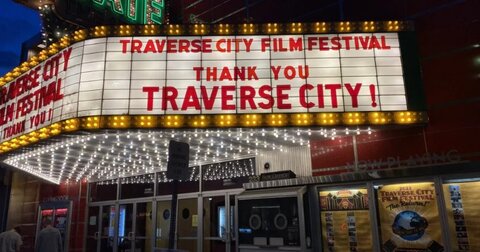Michael Moore ends film festival 2 years after $1M grant
Taxpayers gave a cool million for anti-capitalist auteur’s movie shindig in Traverse City
Michael Moore’s Traverse City Film Festival is permanently closing its doors two years after nearly $1 million in taxpayer-funded COVID relief money. Only one film festival has been held since the $933,000 grant was awarded.
Michael Moore said back in June 2021 that the grant “literally saved the Traverse City Film Fest and our theaters.”
Moore, who at one time was worth $50 million, has come under fire in the past for receiving state subsidies while filming an anti-capitalist documentary.
The Michigan Legislature approved a film subsidy program in 2008, aimed at turning the cold and rainy state into the Hollywood of the Midwest. While the Michigan Film Office tried to lure filmmakers to Michigan, hoping to create jobs, the program was discontinued in 2015, having cost taxpayers $500 million but creating no new permanent jobs.
Moore originally opposed film subsidies and challenged the Michigan Film Office director on them in July 2008.
“These are large multinational corporations — Viacom, GE, Rupert Murdoch — that own these studios,” Moore said then. “Why do they need our money, from Michigan, from our taxpayers, when we're already broke here?"
Moore soon changed his stance. The next year, he was asking for taxpayer funds.
Shortly after Moore was appointed to the Michigan Film Office Advisory Council, his 2009 movie “Capitalism: A Love Story,” applied for a $1 million taxpayer film subsidy. The documentary was partly filmed in Michigan.
The film included a scene of Moore on Wall Street with empty money bags, demanding taxpayer dollars be returned to the American people — a response to the federal government’s bailout of big banks. Moore’s production company received $842,000 from Michigan taxpayers.
“Michael Moore’s team hypocritically accepted taxpayer funds for a documentary featuring Moore demanding bankers give taxpayers their money back,” said Michael LaFaive, senior director of fiscal policy at Mackinac Center for Public Policy. “The irony is rich, but not as rich as Moore himself, who was and remains more than capable of underwriting his own filmmaking.”
Michigan may be considering bringing back the film incentive program. LaFaive argued that the program failed to achieve its promise.
“The film production tax incentive produced windfall profits for those who needed it least, and it did not provide net new jobs,” LaFaive told CapCon.
The Traverse City Film Festival did not respond to a request for comment.
Michigan Capitol Confidential is the news source produced by the Mackinac Center for Public Policy. Michigan Capitol Confidential reports with a free-market news perspective.



 Dearborn school contract appears to ignore Supreme Court ruling
Dearborn school contract appears to ignore Supreme Court ruling
 Michigan Education Association is down 37,000 members in a decade
Michigan Education Association is down 37,000 members in a decade
 Dearborn schools responds to CapCon story on contract language
Dearborn schools responds to CapCon story on contract language